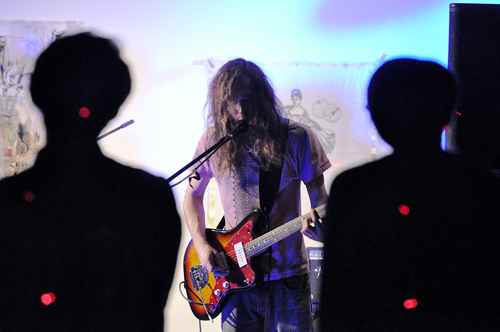Do you ever wish you knew a little more about local music? Do you readily and loudly express your disappointment when a show isn’t as good as you thought it would be?
What’s in a name?

Do you ever wish you knew a little more about local music? Do you readily and loudly express your disappointment when a show isn’t as good as you thought it would be?
We’ve all been in a situation like this: You’re trying to decide what to do on a Saturday night, and a friend mentions that The Orange Spaceship Monopolies are playing at a local bar and you should come. You utter some nonsense along the lines of: “Oh…um…yeah. Of course I’ve heard of The O.S.P. They’re amazing!” and then attend the show only to discover that the titular “orange” and “spaceship” refers to pumpkin-colored astronaut stage attire and out-of-this-world synthesized beats.
Fortunately, it’s easier than you think to identify music genres before you subject yourself to them. Just by looking at the artist’s name, you can make certain assumptions about what you will be listening to for an hour of your life. Here are a few tips for making an educated, if essentially uninformed, night-out decision:
1. Singular name
If the artist only goes by one name, chances are it’s a pop act or you’re in a strip club (examples include Prince, Adele, Madonna, Cher, Usher and Beyonce). Thankfully, there are not a lot of local artists who feel important enough to brand themselves with a single name, so the risk is low.
2. Full name
Here’s where it gets tricky. If you assume every artist going by their name is a singer-songwriter, think again (examples include Andrew Bird, John Denver, Carly Simon, Brandi Carlile, Ray LaMontagne, Fiona Apple and Nick Cave). You could be going to a country show—almost every one of them goes by their name—or an amateur hour. If that’s what you’re looking for, then great! But if you want singer-songwriter vibe or for-sure unique sounds, you’ll have to pick one randomly based on venue or actually do some research.
3. Names beginning with “The”
There are a lot of bands whose names begin with “The,” but most of them are rock, folk-rock or alternative (examples include The Beatles, The Civil Wars, The Shins, The Beta Band, The Clash, The Smiths, The Libertines and The Raincoats). Oftentimes, these bands use lots of different instruments and like to mix things up, so it’ll probably be a good show (if you’re into that sort of thing)!
4. Dashes, numbers and caps
You’re about to hear some rap or hip-hop (examples include B.o.B., Jay-Z, Run-D.M.C. and Tech N9ne). Additionally, if it sounds like the name is made up—like Eminem or LL Cool J—it’s probably also rap…or you wandered back into that strip club to see Karma.
5. Random words
Utilizing random adjectives and verbs in a name is a common practice throughout all genres of music, so you’ll have to use your head here; for instance, a band called Death Fuckers would probably not be a folk duo, but rather, a punk group. A lot of hard rock bands do this (examples include Deep Purple, Nine Inch Nails, Guns ’n’ Roses and Alice in Chains), as do lots of other bands.





